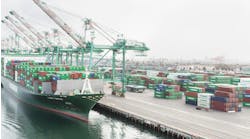Download this article in PDF format.
After navigating the complexities of the global pandemic, high demand for its products and low availability of critical components like semiconductors, the European electronics distribution sector is dealing with some new challenges and also leveraging new opportunities this year.
The ongoing war in Ukraine; devastating catastrophes like the earthquakes in Turkey and Syria; and myriad geopolitical forces are all at work in 2023. European distributors are addressing these ongoing challenges while also keeping an eye out for new opportunities. For example, some are rethinking their supply chains in an effort to get production closer to their customers. Others are investing in technology that provides improved supply chain visibility, and still others are using this time to expand into new markets.
In late 2022, for example, industrial-grade memory product maker Intelligent Memory announced that it was signing on three new European distributors. Based in Germany, the manufacturer signed strategic partnerships with Alcom electronics in Benelux (Belgium, the Netherlands and Luxembourg); CSI S.A. in Poland; and Simms International plc in the UK.
According to Intelligent Memory, the addition of these three new distributors would help the manufacturer expand its reach into Europe’s largest industrial markets. “It is increasingly complex to design industrial solutions with the ever more dependencies that need to be considered,” said Intelligent Memory’s David Raquet in a press release. “For this reason, we are looking for strategic partners that can help guide customers through complexities and advise on the solutions that best match their needs.”
2023 Top 15 European Distributors List >
Mergers and Acquisitions
Distributors are also using mergers and acquisitions (M&A) to expand their European footprints. In March, RFMW, a specialized distributor of RF and microwave products, acquired MRC Gigacomp (MRCG) and MRC Components (MRCC) in Germany. Both MRCG and MRCC represent and distribute products for manufacturers of RF, microwave, millimeter-wave components in Germany, Austria, Switzerland and Benelux.
“We appreciate MRC’s closely aligned mission and philosophy with RFMW’s,” said RFMW’s Mike Carroll in a press release. “MRC’s excellent customer relationships and European coverage will further enhance RFMW’s international footprint and strengthen our line card. We are confident that our customers and suppliers will benefit from the acquisition, and we look forward to working with the team.”
In other example of how distributors are expanding their footprints in Europe, in October specialty electronic component distributor TTI, Inc. – Europe completed the acquisition of Ecopac (UK) Power Ltd, which distributes power supplies and LED drivers in the UK and in Ireland.
“Ecopac Power is renowned in the UK for its broad product portfolio, technical solutions and value-added service of power products, having served the industry for nearly 30 years,” said TTI, Inc.—Europe’s Geoff Breed in a press release. “There are many synergies between the two companies, sharing the same principles on core distribution values, focus on customer service and total satisfaction, and so this collaboration is a natural fit.”
Getting Deeper into the Chip Game
As the electronics industry continues to shake off the impacts of the global chip shortage and plans for the future, the European Commission wants to boost the continent’s semiconductor production to 20% by 2030—up from the current 10%. The EC says the European Chips Act will bolster Europe’s competitiveness and resilience in semiconductor technologies and applications, and help achieve both the digital and green transition.
According to IEEE Spectrum, the European Chips Act may be the path to building more “innovation capacity” in Europe. It says the act’s €43 billion in public and private investment plans includes funding for R&D, manufacturing incentives and more secure supply chain solutions.
“Chips are strategic assets for key industrial value chains,” the EC points out. “With the digital transformation, new markets for the chip industry are emerging such as highly automated cars, cloud, Internet of Things, connectivity, space, defense and supercomputers.” In 2020, approximately one trillion microchips were manufactured globally. Just 10% of those chips were produced in Europe.
“Recent global semiconductor shortages forced factory closures in a range of sectors, from cars to healthcare devices,” the EC says. “This made more evident the extreme global dependency of the semiconductor value chain on a very limited number of actors in a complex geopolitical context.”








